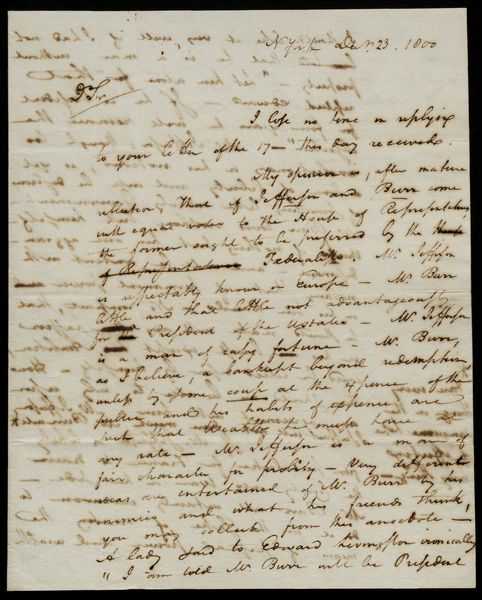Hamilton, Alexander (1757-1804) to Harrison Gray Otis
High-resolution images are available to schools and libraries via subscription to American History, 1493-1943. Check to see if your school or library already has a subscription. Or click here for more information. You may also order a pdf of the image from us here.
A high-resolution version of this object is available for registered users. LOG IN
Gilder Lehrman Collection #: GLC00496.028 Author/Creator: Hamilton, Alexander (1757-1804) Place Written: New York, New York Type: Autograph letter signed Date: 23 December 1800 Pagination: 4 p. ; 25 x 20 cm. Order a Copy PDF Download(s): Download PDF
Hamilton suggests that the Federalists should support Jefferson for President rather than Burr when the tied election goes to the House of Representatives. Hamilton's response is an extended comparison of the two men concluding with the statement: "In a choice of Evils, let them take the least - Jefferson is in my view less dangerous than Burr." Hamilton concludes with comments about relations with France and Britain which responds to Gray's short discussion of the Convention of 1800 with France. Harrison Gray Otis, a leading Boston Federalist, had written to Hamilton on 17 December 1800. Otis asked Hamilton for a private communication on Burr's character since no one among the Federalists knew Burr personally.
Signer of the U.S. Constitution.
In 1800, the young republic faced another crucial test: whether national leadership could pass peacefully from one political party to another. Once again, the nation faced a choice between John Adams and Thomas Jefferson.
Deep substantive and ideological issues divided the two parties. Federalists feared that Jefferson would reverse all the accomplishments of the preceding 12 years. A Republican president, they thought, would overthrow the Constitution by returning power to the states, dismantling the army and navy, and overturning Hamilton's financial system. The Republicans charged that the Federalists, by creating a large standing army, imposing heavy taxes, and using federal troops and the federal courts to suppress dissent, had shown contempt for the liberties of the American people.
The contest was one of the bitterest in American history. Jefferson's opponents called him an "atheist in religion and a fanatic in politics." They claimed he was a drunkard, an enemy of religion, and the father of numerous mulatto children. Jefferson's supporters called President Adams a warmonger, a spendthrift, and a monarchist who longed to reunite Britain with its former colonies.
The election was extremely close. Because of the three-fifths representation of Southern slaves, the final outcome hinged on results in New York. Rural New York supported the Federalists and Republican fortunes therefore depended on voting in New York City.
Jefferson appeared to have won by a margin of eight votes. But a complication arose. Because each Republican elector cast one ballot for Jefferson and one for Burr, the two men received exactly the same number of electoral votes. Under the Constitution, the election was thrown into the Federalist-controlled House of Representatives. Instead of emphatically declaring that he would not accept the presidency, Burr failed to say anything. So Federalists faced a choice: they could elect the hated Jefferson, or they could throw their support to the opportunistic Burr.
In this private letter, Hamilton urges Federalists in the House of Representatives to support Jefferson. Hamilton considers Burr too power-hungry and personally ambitious for public service.
Citation Guidelines for Online Resources
The copyright law of the United States (title 17, United States Code) governs the making of photocopies or other reproductions of copyrighted material. Under certain conditions specified in the law, libraries and archives are authorized to furnish a photocopy or other reproduction. One of these specific conditions is that the photocopy or reproduction is not to be “used for any purpose other than private study, scholarship, or research.” If a user makes a request for, or later uses, a photocopy or reproduction for purposes in excess of “fair use,” that user may be liable for copyright infringement. This institution reserves the right to refuse to accept a copying order if, in its judgment, fulfillment of the order would involve violation of copyright law.
